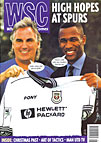 Helenio Herrera passed away recently leaving a legacy of defensive football behind, but Cris Freddi argues that the iconic manager was schooled in Total Football too
Helenio Herrera passed away recently leaving a legacy of defensive football behind, but Cris Freddi argues that the iconic manager was schooled in Total Football too
According to Channel 4, some of the Italian press have been calling him ‘the first real football coach’, which is bollocks but shows the right respect. If you’re an Inter fan, and aren’t we all, HH was the only coach.
Not the best loved, I grant you. His nickname, Il Mago, means wizard or magician, but with undertones of sorcery, the black arts. This had to do with his emphasis on dark defence but also a certain exoticism: born in Buenos Aires, brought up in Casablanca, naturalized French, a new wife in every country he coached in. Some of the facts, naturally enough, don’t match the legend.
For a start, he didn’t start out as the high priest of catenaccio. His Barcelona side which won the 1959 Spanish League had a strong enough defence but above all a forward line made up of the great and the good: Kocsis, Czibor, Suárez, Kubala, Evaristo, not necessarily in that order. When Czibor & Kubala complained about his bonus system, he dropped them both before a European Cup Semi-Final. Barcelona lost each leg 3-1 to the hated Real Madrid, and Herrera was on his way within a month.
It was Barca’s loss. While they had to wait until 1992 before winning the European Cup, HH was soon doing it twice in a row with Internazionale. Again, he didn’t go with the intention of playing umpteen at the back, but once he realized attacking football wasn’t going to succeed in Italy, he set out to defend better than any of them. And to carry on showing who was boss. Unlike Barcelona, Inter allowed him to sell the darling of the fans (Antonio Angelillo) and after that his flair for team selection wasn’t in doubt. Allowed to use only two foreigners in the league, he bought exactly the right ones, persuading Barcelona to sell Suárez, before buying then selling the hard working England centre-forward Gerry Hitchens in exchange for the flying Jair. With a strong homegrown defence, Corso supporting Suárez on the left, and the great Mazzola up front, it was ‘today Serie A, tomorrow the world’. When Inter won the 1964 European Cup at the first attempt, they were the first club to do it without losing a match.
Along the line, fact and myth became lost in the mists. The slogans pasted to changing room walls; Hitchens having to walk six miles back to the training camp because he and Corso were twenty seconds late for the team bus; Omar Sivori deliberately kicking the ball at Herrera on the bench; Liverpool cheated out of the 1965 semi-final by the referee; Celtic’s Lions of Lisbon finally slaying the defensive dragon.
All the Celtic bullshit (and its 30th anniversary this year) overlooks the simple fact that Inter were without Suárez and Jair, so there was no springboard out of defence. Sarti & Co held out wonderfully well until they were beaten by an offside goal (see the BBC freeze-frame for proof). Meanwhile the Liverpool Affair concerns two allegedly illegal goals, Peiró kicking the ball out of the keeper’s hands, Corso scoring direct from an indirect free kick. Total cobblers. The ball was on the ground when Peiró nicked it away (Ian St. John: “You must blame Tommy for dreaming”) and the photo showing the referee with his arm raised for the free kick is a still frame from the film: he was simply waving Corso to hurry up and take it. Anyway, where are the Scouse protests about the third goal, the one that sent Inter through? Picchi to Mazzola to Peiró, some cool passing through the middle, with no angles to play with, for Facchetti to thrash the ball low past Lawrence. David Coleman: “Oh, it’s like a volcano!” A giant left back appearing at centre forward to score with his right foot. The term Total Football mean anything to you?
And that, though nobody ever said so, was Herrera’s main legacy. Vilified for the consecration and spread of total defence, he was as misunderstood as Ramsey: hardly his fault if other coaches followed his methods but without the right players. At Inter he had the greatest playmaker of the decade, the sharpest striker, the fastest winger, and world class defenders who could step out from the back. His real heirs weren’t Arsenal or any of the Argentinian choppers, but Cruyff’s great Ajax, who ironically beat a declining Inter in the 1972 final, by which time he was long gone. People forget how few goals Ajax conceded (or scored), how content they were to quieten away crowds and win European Cup Semi-Finals 1-0 on aggregate. If that’s the bastard child of Herrera’s arcane practices, we can all live with it, and I suspect so could he.
From WSC 131 January 1998. What was happening this month